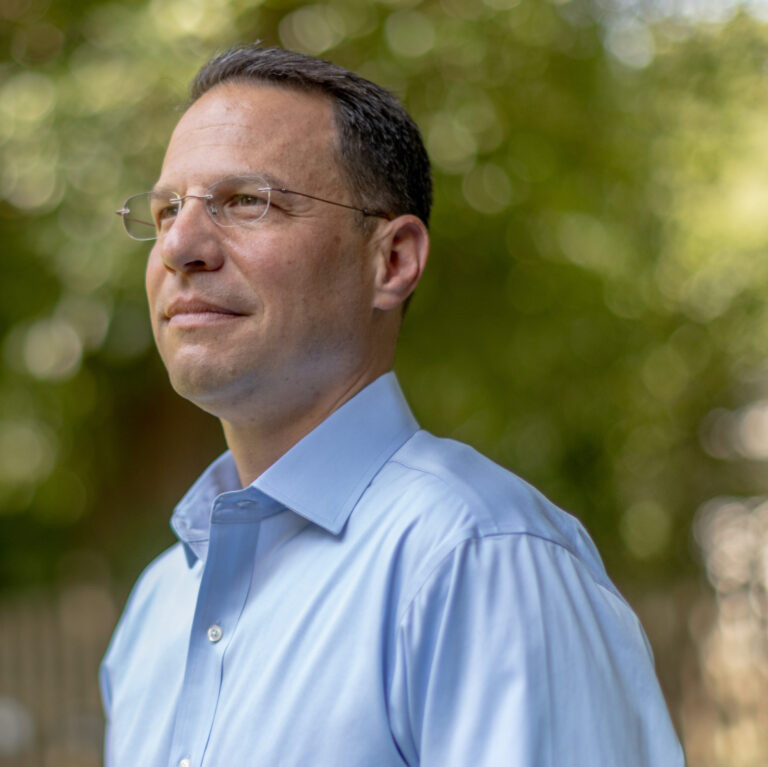Pennsylvania Gov. Josh Shapiro wrote in his college newspaper in 1993 that peace “will never come” to the Middle East and expressed skepticism about the viability of a two-state solution, describing Palestinians as “too battle-minded” to coexist with Israel.
In the opinion article, titled “Peace not possible,” Shapiro, then a 20-year-old student at the University of Rochester, argued that a negotiated accord between Israeli and Palestinian leaders would not end conflict in the region, writing: “Using history as precedent, peace between Arabs and Israelis is virtually impossible and will never come.”
He described the Arab world as fractious, and wrote that the then-Palestinian leader Yasser Arafat was in danger of being assassinated “by his fellow belligerent Arabs.”
“Palestinians will not coexist peacefully,” Shapiro wrote. “They do not have the capabilities to establish their own homeland and make it successful even with the aid of Israel and the United States. They are too battle-minded to be able to establish a peaceful homeland of their own.”
The op-ed was published in the Campus Times, the student newspaper at the university where Shapiro was once the student body president. An Inquirer reporter accessed the article this week in the newspaper’s archives, which are maintained by the school’s library system.
Manuel Bonder, a spokesperson for Shapiro, said in a statement that the governor’s position has changed over the last three decades and noted his support for a two-state solution.
“Governor Shapiro has built close, meaningful, informative relationships with many Muslim-American, Arab-American, Palestinian Christian, and Jewish community leaders all across Pennsylvania,” Bonder said. “The governor greatly values their perspectives and the experiences he has learned from over the years — and as a result, as with many issues, his views on the Middle East have evolved into the position he holds today.”
In remarks to reporters Friday, Shapiro reiterated that the column does not represent his beliefs today.
“I was 20,” he said at an unrelated news conference in Delaware County. “I have said for years, years before October 7, that I favor a two-state solution — Israelis and Palestinians living peacefully side-by-side, being able to determine their own futures and their own destiny.”
» READ MORE: Would Josh Shapiro’s stances on Israel help or hurt Kamala Harris’ ticket?
As Shapiro has emerged as one of the front-runners for the vice presidential nomination, some pro-Palestine groups have opposed him, citing his views on the war in Gaza. He has been a steadfast supporter of Israel, condemning protests in December outside an Israeli-owned falafel restaurant as antisemitic and calling for police in May to end a protest encampment at the University of Pennsylvania.
Shapiro has also been deeply critical of Israeli Prime Minister Benjamin Netanyahu, whom he has described as “a dangerous and destructive force” and “one of the worst leaders of all time.” In remarks to reporters last week, he said widespread suffering in Gaza is unacceptable, and has advocated for a two-state solution.
“I’m someone who has always been hopeful that peace would come to the Middle East,” Shapiro said.
Several prominent Democrats have in recent days denounced some of the opposition to Shapiro as antisemitic. The governor’s stances on the conflict are generally in line with those of Harris and with other Democrats in contention for the vice presidential nomination.
“Singling him out, or applying a double standard to him over the war in Gaza, is antisemitic and wrong,” U.S. Rep. Adam Schiff (D., Calif.), a candidate for U.S. Senate who is Jewish.
Shapiro wrote the college newspaper op-ed in September 1993, days after the first Oslo Accord was signed and outlined a potential pathway to end conflict in the region. His piece came just after the famous handshake between Israeli Prime Minister Yitzhak Rabin and Arafat, chairman of the Palestinian Liberation Organization, on the White House lawn as President Bill Clinton looked on.
In the article, Shapiro said Arafat was “an egotistical, power-hungry tyrant who is in danger of being assassinated by his fellow belligerent Arabs because he does not represent the majority opinion.”
He continued, writing that “the only way a ‘peace plan’ will be successful is if the Palestinians do not ruin it.”
“I find it impractical to believe that factions of Arabs can miraculously unite in peace as Palestinians, so they can coexist with Israel,” he wrote.
Shapiro concluded, writing, “Despite my skepticism as a Jew and a past volunteer in the Israeli army, I strongly hope and pray that this ‘peace plan’ will be successful. History is not made by diplomatic handshakes between two political leaders but rather when two age-old foes can have the courage to stop hating, begin healing and exist in peace and tranquility.”
Shapiro’s team did not immediately provide details about his volunteering in the Israeli military that he referenced in the college article.
Khalil Jahshan, executive director of The Arab Center Washington D.C., a nonpartisan think tank, said Shapiro’s views expressed in the article would have been considered “right wing” at the time, and that the prevailing sentiment then was excitement about the possibility of a two-state solution.
He said the language used “smacks of intolerance and a bit of racism.”
“I don’t believe in litmus tests,” Jahshan said, acknowledging that the article is three decades old. “But at the same time, it is his own words ... His name is on it. He has to assume responsibility for it. If he is indeed, as everybody knows, espousing different ideas, then it’s his responsibility to explain that.”
The Oslo Accords, reached after years of armed conflict, were deeply controversial through the nineties — both in the Middle East and the United States — and did not bring lasting peace.
The first accord was a “declaration of principles” that was secretly negotiated in Norway and outlined a path to a two-state solution. Under the terms of the mutual recognition agreement, Arafat renounced terrorism and violence against Israel, and Rabin pledged to initiate a withdrawal from Gaza and part of the West Bank.
Clinton at the time hailed the accord as historic, thanking Rabin and Arafat for their “tenacity and vision” and vowing in a speech that the United States would assist “in marshaling the resources necessary to implement the difficult details that will make real the principles to which you commit yourselves today.”
Polls conducted in 1993 showed a majority of Jewish Americans were hopeful at the time that the accord would lead to an end to conflict in the region, but were still skeptical.
More than 8 in 10 respondents to an American Jewish Committee survey said they supported the Israeli government’s handling of the secret negotiations, and 57% supported establishing a Palestinian state. Only a third thought the PLO could be relied on to “refrain from terrorist attacks against Israel.”
The full op-ed can be found here.
Staff writer Gillian McGoldrick contributed to this article.


















